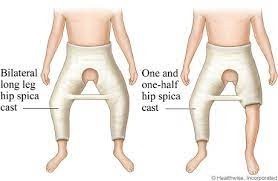The nurse is caring for an infant with a hip spica cast who has just returned from surgery. Which nursing action will be priority for this patient?
Palpating a brachial pulse.
Assessing bilateral radial pulses.
Auscultating the heart rate apically.
Checking capillary refill in the toes.
The Correct Answer is D
Hip spica casts are typically used to immobilize the hip joint and are often used in the management of hip dysplasia or after surgery. These casts can cause restricted mobility and limit blood flow to the legs and feet, which can lead to complications such as swelling, decreased circulation, or pressure sores.
Checking capillary refill in the toes is a critical nursing intervention to assess for the presence of adequate circulation and blood flow to the affected limb. If capillary refill is slow or absent, it may indicate compromised circulation and require immediate intervention to prevent further complications.
Palpating a brachial pulse, assessing bilateral radial pulses, or auscultating the heart rate apically are not the priority nursing actions for an infant with a hip spica cast. While monitoring vital signs and circulation are important components of nursing care, the priority at this stage is to assess and manage the immediate postoperative needs of the patient, including monitoring for potential complications related to the hip spica cast.

Nursing Test Bank
Naxlex Comprehensive Predictor Exams
Related Questions
Correct Answer is A
Explanation
This statement demonstrates an understanding of proper cast care for itch relief. Using a cool air dryer on a low setting can help circulate air and provide relief from itching under the cast. It is important not to use a hot air dryer as it may cause discomfort, skin irritation, or burn. Trickling water or inserting objects into the cast can lead to moisture accumulation and potential complications.
Correct Answer is C
Explanation
Bowel sounds are the result of muscular contractions in the intestines, indicating the movement of food, fluids, and gas through the gastrointestinal tract. After surgery, the normal function of the intestines, including peristalsis, may be temporarily impaired. As the intestines recover and regain their normal motility, bowel sounds will become audible.
The return of bowel sounds is an encouraging sign that the gastrointestinal system is starting to function again. It indicates that peristaltic activity has resumed and that the intestines are moving and processing the contents within. This is an essential step in the postoperative recovery process, as it indicates the return of normal gastrointestinal function and can lead to the resumption of oral intake and passage of stool.
While the other options may also be associated with the return of GI function, such as feeling hungry or passing flatus or stool, the presence of bowel sounds is a more reliable and direct assessment finding that indicates the resumption of peristaltic activity.
Whether you are a student looking to ace your exams or a practicing nurse seeking to enhance your expertise , our nursing education contents will empower you with the confidence and competence to make a difference in the lives of patients and become a respected leader in the healthcare field.
Visit Naxlex, invest in your future and unlock endless possibilities with our unparalleled nursing education contents today
Report Wrong Answer on the Current Question
Do you disagree with the answer? If yes, what is your expected answer? Explain.
Kindly be descriptive with the issue you are facing.
